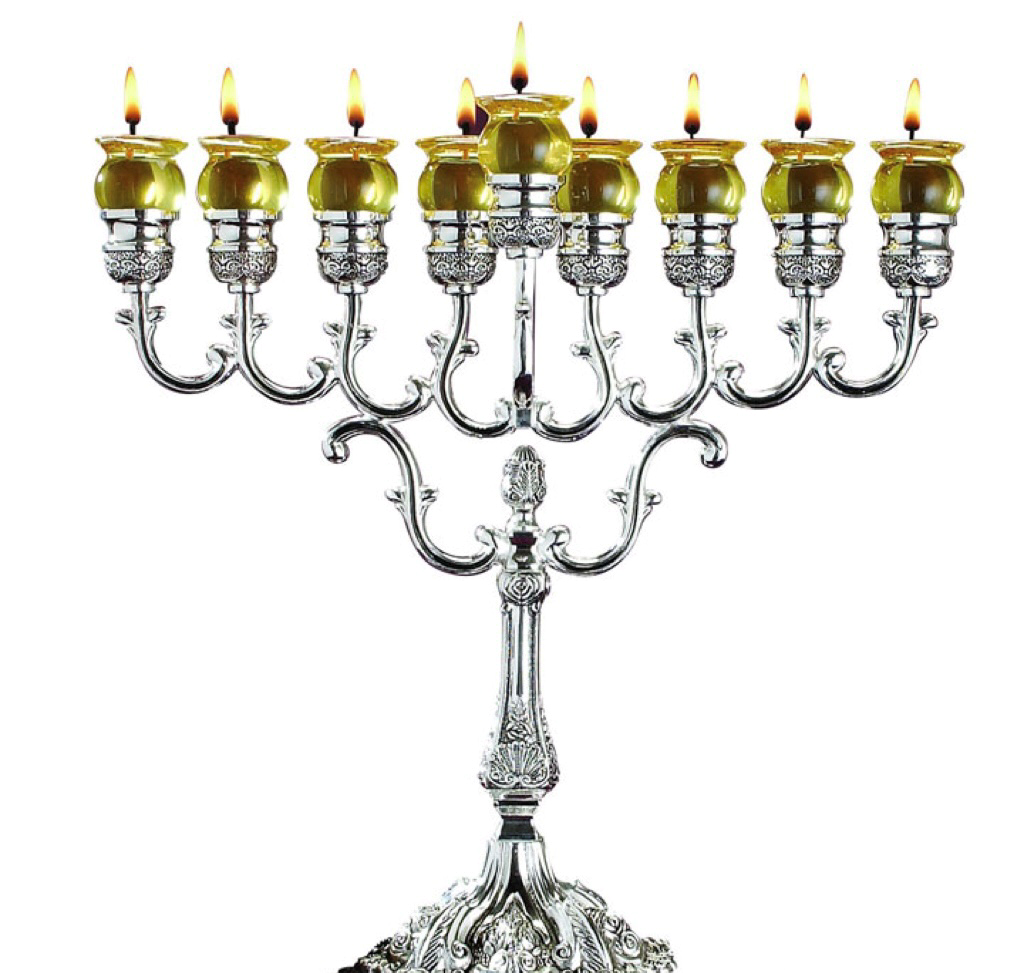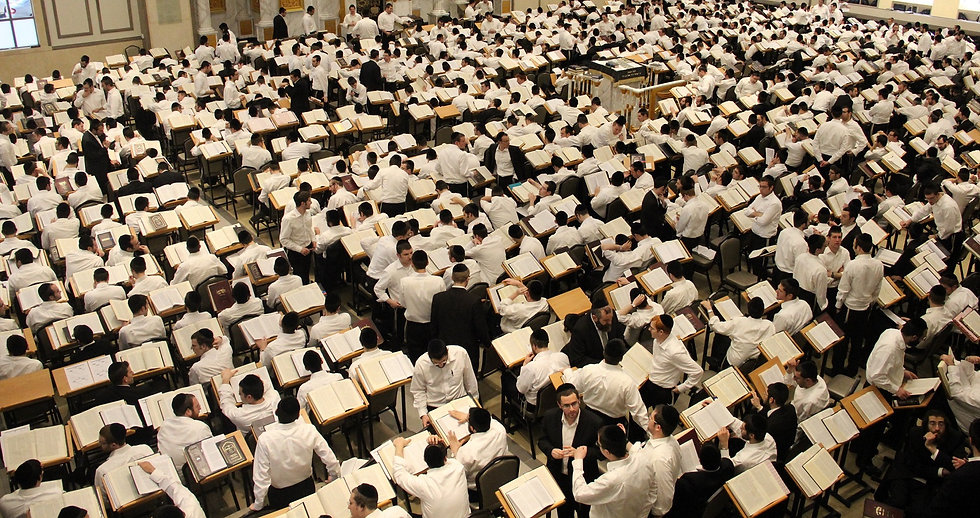The Rambam (based on the Gemara in Berachos 34b) writes that in the place where a Baal teshuvah stands, the greatest tzaddikim can’t stand. Why? Because balei teshuvah suppress their desires. They conquer their impulses. That’s how great and special they are. I want to share with you something incredible: In Hashevinu – the prayer we recite when we return the Torah, we ask Hashem to help us return to him. We say chadeish yameinu kikedem- renew our days as of the past… Kikedem means the past – total bliss. This means that if we do teshuvah it will be like the past – it will be as if we didn’t sin! We will be clean and good as new!
It goes even further: The word Kedem ((קדם – past, consists of three letters: Kuf, Daled, and Mem. I heard from my father, Rav Yitzchok Fingerer shlita that the Oheiv Yisroel says that these letters spell out Kayin, Dovid, and Menashe – three outstanding Jewish people who committed sins. Kuf stands for Kayin. Kayin committed one of the first major sins – He murdered his brother, Hevel. Daled stands for Dovid Hamelech, who purportedly sinned (the Gemara says that on a deeper level, Dovid didn’t sin at all). Mem is for Menashe, the King of Yisrael, who committed severe transgressions and violations. Kuf, Daled, Mem – Kayin, Dovid, and Menashe – even these great people, these people who committed sins, when they do teshuvah, Hashem will love them again like he loved them before. They will get a clean state – it will be like they never sinned! The same is true for us. It’s never too late to return! Hashem wants us back!
Meshulam was a young man who was raised in a regular observant home. Already from a young age, Meshulam had many struggles and hardships, and he started a decline – a spiritual descent. By the time he was 17, he went to his father to say goodbye. He said, “Father, I’m going to India.” The father was surprised. “India?” He said, “I didn’t know there were yeshivas in India.” Meshulam said “Father, with all respect, I think you’ve been a little naïve… I don’t keep Shabbos anymore. I don’t eat kosher. I deviated. I went far off. I’m going to India.” The poor father, a widower says to Meshulam, “How could you? How could you break my heart? Please! I beg you to stay with me!” Meshulam fights back, “No, I’m going to India. I can’t stand it here anymore.” The Father is crying. Screaming, he says “Meshulam, don’t go! Stay with me! Meshulam you’re killing me!” Meshulam runs out of the house. Off he went to India.
For three years Meshulam was in India. He was doing the most awful and corrupt things. One afternoon he met an old friend of his father. His friend looks very sad. He runs over to Meshulam and says, “Meshulam, I’m so sorry! I just never got a chance to offer my condolences…” Meshulam is surprised. “Condolences? Condolences for what?” The man says, “What do you mean for what? Your father!” Meshulam says, “My father? What happened to my father? Tell me! What happened?” The man was shocked, “You didn’t hear? You mean no one told you?” Just a few months after you left your father died from a broken heart. He couldn’t get over the fact that you went to India to do bad things. Meshulam, I hate to break it to you but your father’s dead.” Meshulam stood paralyzed in place. “My father’s dead? My father’s dead? Meshulam fell to the floor and started crying like he had never cried before. He didn’t stop crying. He didn’t know what to do but his heart told him to go to Eretz Yisroel.
When he arrived at the airport, he went straight to the Kosel, to the western wall. Meshulam ran to the wall. He went up and leaned against the holy stones. He was crying like a baby. He says, “Hashem, please forgive me! I didn’t mean to kill my father! I fell so far! Let me return!” Meshulam was there for a long time, but he still felt the guilt – he felt a heavy stone weighing on his heart. He decided to write a letter and put it in the wall. Meshulam wrote a note. He wrote as follows: Hashem, I didn’t mean it! I want to be frum again! I want to come back home! Please forgive me and help me return! Meshulam puts the note in the wall and the note falls out. He puts the note in again, but again it falls out. He tried a third time but to no avail. Now Meshulam broke down. He said, “Hashem must not want me! I fell too far! There’s no more hope for me!”
Someone nearby told Meshulam to try one more time. So, for the fourth time, he puts the note in the wall again – this time in a higher stone. When he put the note in the stone another note fell out. Meshulam looked down at the note to try to put it back, but he saw something that shook him to the core. He didn’t believe it. On the note in big bold letters was his name – Meshulam. He recognized the handwriting – it was his father’s. With trembling hands, he opened the letter and began to read: “Dear Meshulam, it’s been two months since you left for India. I’m here at the Wall, pouring my heart out. I want you to know that although I’m hurt and pained, although you abandoned me and your people – I will never stop loving you. I hope that you will return, and I forgive you with all my heart and soul. Hashem loves you. Please come back home.” Meshulam changed his life around and became a baal teshuvah. No matter how far we stray, Hashem wants us back. He wants us to return.
The Gemara in Yuma (86b) says something so incredible: If you do teshuvah out of love for Hashem, if you do teshuvah because you recognize Hashem’s goodness and kindness, then Hashem will take your sins and convert them into mitzvahs! Isn’t that incredible? It goes even further: I heard from my father that the Chasam Sofer says something unbelievable: He says that if a person eats pork and then he does teshuvah – you wouldn’t believe what Hashem will do. Says the Chasam Sofer, Hashem will take the pig he ate, and he turns it into a Karbon Pesach! Hashem makes it that retroactively, he never ate the pig. Instead, he ate a piece of the holy Karbon Pesach! That’s the power of a true and sincere teshuva!
This is very comforting. We all struggle with different desires and temptations. We all struggle with looking at things that we shouldn’t be looking at. We all do things that we really shouldn’t be doing. We all have different challenges that we deal with behind closed doors. We live in such a pervasive, immoral, and corrupt world – but Hashem, our loving father wants us back. He is waiting for us to return. Let’s take that first step. It may seem like a long way up but that first step makes all the difference. Do you understand the power of teshuvah? When you do teshuvah out of love it doesn’t only give you a clean slate. It’s more than that. It turns your sins into currency, it turns it into a commodity. It turns your sins into a mitzvah – it turns your sins into gold! We can return! Let’s do this! Let’s return to Hashem! We’re going to come back home!
There is a powerful story I mentioned once before about a farmer who was tending to his crops when he noticed a large egg on the ground. Thinking that the massive egg was from the hen, he picked it up and put it in the coop, placing it next to the other eggs – the chicken eggs. A few days later, the eggs hatched, and adorable chicks came out. However, a funny-looking chicken came out of the strange egg. It turns out that it wasn’t a chicken at all – it was an eagle. The other chickens didn’t know that, and they thought even though he looked different he was still one of them. The eagle began to do all the things the chicks did. He dug for worms in the dirt and flapped his wings up and down. He skipped around the coop making clucking sounds. After all, he was a chicken even if he didn’t look like one. At least that’s what he thought.
A short while later, the eagle saw a magnificent bird flying high in the sky. The eagle asked the chicken what type of bird it was. The chicken said, “That bird is an eagle. He is the king of the sky, and he soars to the greatest of heights. We however can’t do that because we are chickens and chickens don’t fly.” Later that day, that same bird – the majestic-looking eagle landed near the chicken coop. With his eagle eye, he recognized one of his own – a young eagle roaming and playing around with the chicks. He made his way to the eagle and asked him, “Why are you down here? You’re an eagle. You should be soaring up in the sky!” The young eagle asked, “What do you mean? I’m just a chicken and chickens can’t fly.” The adult eagle told the little eagle to jump on his back and they flew high in the sky. The little eagle was amazed. It was so incredible to be so high up. The adult eagle then landed on a mountain and said, “Now it’s your turn to fly.” That is precisely what the little eagle did. He spread his wings and soared high.
The lesson is so powerful. The eagle thought he was a chicken just like everyone else. Many of us can be compared to that eagle who didn’t realize his true identity. A lot of us fail to realize who we really are. We don’t recognize our true inner greatness. We must realize that we are holy and that we can soar higher and higher. Now, at this time it’s a very auspicious time for teshuvah. Let’s realize our true greatness. Let’s be like the eagle. Let’s soar high. Let’s remember that our struggles and sins come because we are great. We aren’t sticks or stones. We are human and we have challenges. Now is the time – the time is ripe now. We’ve got this! Hashem is waiting for us! Let’s return!








